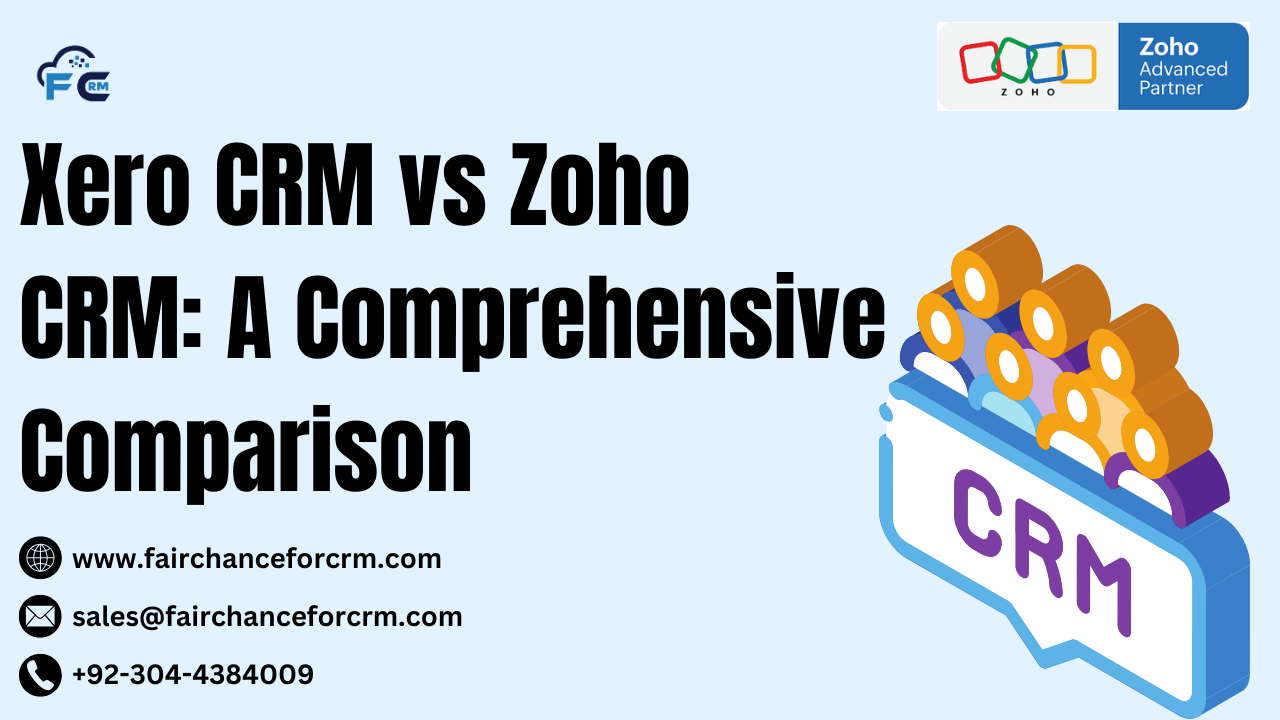In today’s digital world, businesses of all sizes are looking for ways to streamline their customer relationship management (CRM) and improve their marketing and sales processes. Two popular CRM solutions that are widely used are Xero CRM vs Zoho CRM. Both offer robust features designed to help businesses manage customer relationships effectively, but they cater to different needs and come with distinct advantages.
In this article, we will compare Xero CRM and Zoho CRM, analyzing their key features, pricing, pros, cons, and overall suitability for businesses.
Also Read:
Xero CRM vs Zoho CRM
1. Overview of Xero CRM
Xero is best known as a cloud-based accounting software platform. While its primary focus is on financial management, Xero CRM is integrated into its ecosystem to help businesses manage invoicing, payments, contacts, and accounting alongside customer relationship management. It offers a limited CRM functionality compared to other CRM platforms but is well-suited for businesses looking for a simple solution to combine accounting with customer relationship management.
- Target Audience: Small to medium-sized businesses, especially those looking for an all-in-one accounting and CRM solution.
- Key Features:
- Contact management (store customer details and communication history)
- Invoicing and billing
- Expense tracking
- Integration with accounting features (accounting reports, financial statements)
- Cloud-based access (accessible from anywhere)
- Payment management (supports online payments)
- Basic reporting and analytics
2. Overview of Zoho CRM
Zoho CRM is one of the most popular CRM solutions available today. It provides businesses with a comprehensive suite of features aimed at improving customer relationships and sales processes. Unlike Xero CRM, Zoho CRM focuses entirely on customer relationship management, offering powerful sales, marketing, and support tools in one platform.
- Target Audience: Small to large businesses across various industries, from startups to enterprises.
- Key Features:
- Lead and pipeline management
- Sales forecasting
- Marketing automation
- Multi-channel communication (email, chat, phone, social media)
- AI-powered sales assistant (Zia)
- Reporting and analytics
- Customizable dashboards and workflows
- Mobile access
- Integrations with third-party tools and Zoho Suite (Books, Campaigns, etc.)
3. Key Features Comparison
Let’s take a closer look at how Xero CRM vs Zoho CRM stack up in terms of core features:
Contact Management
- Xero CRM: Xero CRM offers basic contact management, allowing businesses to store customer information and track interactions. Since Xero is more accounting-centric, the CRM functionality is designed to help users manage customer data in conjunction with financial transactions, such as invoicing and payments.
- Zoho CRM: Zoho CRM offers more robust contact management, with tools to track interactions, categorize contacts, and manage customer profiles in detail. You can segment contacts based on custom fields, and the system offers a 360-degree view of all interactions with customers, including calls, emails, and meetings.
Sales and Pipeline Management
- Xero CRM: Xero CRM’s sales functionality is fairly basic. It provides tools for managing quotes, invoices, and payments, but it doesn’t offer advanced sales pipeline tracking or deal management. If you’re primarily looking for CRM features related to accounting and invoicing, Xero may suffice.
- Zoho CRM: Zoho CRM excels in pipeline management, providing customizable sales stages and detailed deal tracking. It helps sales teams monitor leads as they move through the sales funnel, and provides forecasting tools to predict sales performance. Zoho’s pipeline management tools are more advanced than Xero’s, especially for businesses with a dedicated sales team.
Marketing Automation
- Xero CRM: Xero CRM does not have robust marketing automation tools. It’s primarily designed for accounting and billing, with basic functionality for handling customer contacts and invoices. For marketing activities, users need to rely on integrations with other platforms or third-party applications.
- Zoho CRM: Zoho CRM shines when it comes to marketing automation. It allows you to create automated workflows for lead nurturing, email marketing campaigns, and follow-up reminders. Zoho CRM also integrates seamlessly with Zoho Campaigns for email marketing, as well as other tools for social media marketing, webinars, and more.
Analytics and Reporting
- Xero CRM: Xero offers basic financial and customer-related reporting, such as sales reports, profit and loss statements, and expense tracking. However, when it comes to advanced CRM reporting and customer behavior analytics, Xero CRM falls short.
- Zoho CRM: Zoho CRM provides comprehensive analytics and reporting capabilities. You can generate customized reports on sales performance, pipeline health, marketing campaigns, and customer activity. Zoho also includes AI-powered insights via Zia, helping businesses make data-driven decisions. Zoho’s analytics capabilities are much more advanced than Xero’s.
Integrations
- Xero CRM: Xero integrates primarily with accounting-related tools and applications. It has a strong ecosystem for accounting integrations (such as payroll software, payment processors, and tax software), but its CRM integrations are more limited compared to Zoho.
- Zoho CRM: Zoho CRM integrates with over 500 third-party applications, including social media platforms, email marketing tools, customer support software, and accounting systems. Zoho CRM also integrates seamlessly with other products in the Zoho suite, making it a great choice for businesses already using Zoho products.
Customer Support
- Xero CRM: Xero offers support primarily for its accounting products, with customer service available via email, live chat, and a detailed knowledge base. While support for Xero CRM is available, it’s somewhat limited due to the software’s focus on accounting rather than CRM.
- Zoho CRM: Zoho CRM offers 24/7 customer support through email, live chat, phone, and a comprehensive knowledge base. Zoho has a large community and provides a wealth of resources, including video tutorials, webinars, and forums. Their support is well-regarded and extensive.
4. Pricing Comparison – Xero CRM vs Zoho CRM
Pricing plays an important role when selecting the right CRM solution. Here’s a breakdown of the pricing for Xero CRM and Zoho CRM:
Xero CRM Pricing
Xero’s pricing is primarily focused on its accounting software, but it does offer basic CRM functionalities. Pricing for Xero starts at:
- Xero Starter Plan: $13 per month (includes basic invoicing and accounting features, no advanced CRM features).
- Xero Standard Plan: $37 per month (includes more comprehensive accounting tools, but CRM features are still minimal).
- Xero Premium Plan: $70 per month (includes additional features like advanced reporting, but CRM functionalities are still basic).
Xero’s pricing is primarily geared towards businesses that need accounting and invoicing features, with CRM as a supplementary tool.
Zoho CRM Pricing
Zoho CRM offers a variety of pricing tiers to accommodate different business sizes and needs. Pricing starts at:
- Free Plan: Free for up to 3 users (includes basic CRM features like contact management, lead capture, and email integration).
- Standard Plan: $14 per user/month (includes sales automation, email marketing, and reporting tools).
- Professional Plan: $23 per user/month (includes advanced sales features, workflow automation, and social media integrations).
- Enterprise Plan: $40 per user/month (includes AI-powered analytics, advanced customization, and dedicated support).
- Ultimate Plan: $52 per user/month (includes all features, plus premium support, advanced reporting, and unlimited integrations).
Zoho CRM offers a much more affordable and flexible pricing structure compared to Xero, with a range of plans that cater to small businesses and larger enterprises alike.
5. Pros and Cons – Xero CRM vs Zoho CRM
Xero CRM Pros:
- Simple and intuitive for small businesses looking to combine accounting and CRM functions.
- Seamless integration with Xero’s accounting software.
- Cloud-based access, making it easy to manage invoicing and contacts from anywhere.
- Great for small businesses that need basic CRM functionality alongside financial management.
Xero CRM Cons:
- Limited CRM features compared to dedicated CRM platforms.
- Lacks advanced sales and marketing tools.
- Doesn’t offer in-depth analytics or reporting.
- Primarily focused on accounting, making it less suitable for businesses with complex CRM needs.
Zoho CRM Pros:
- Comprehensive CRM with powerful sales, marketing, and support tools.
- AI-powered insights and reporting.
- Highly customizable to suit the needs of different industries.
- Excellent integrations with Zoho Suite and third-party applications.
- Affordable and scalable pricing options.
Zoho CRM Cons:
- Some advanced features are only available in higher-tier plans.
- Can be complex for beginners to navigate due to the wide array of features.
- The free version is limited to 3 users and lacks advanced functionality.
6. Which CRM Is Best for You? Xero CRM vs Zoho CRM
Choose Xero CRM if:
- You are a small business that primarily needs accounting software with basic CRM functionality.
- You want an all-in-one solution that combines invoicing, payments, and customer relationship management.
- Your business does not require advanced CRM features, such as lead management or marketing automation.
Choose Zoho CRM if:
- You are looking for a comprehensive CRM solution with robust features for sales, marketing, and customer support.
- You want AI-powered insights and advanced reporting to make data-driven decisions.
- You need an affordable, scalable CRM solution that can grow with your business.
Conclusion – Xero CRM vs Zoho CRM
While Xero CRM is a great solution for small businesses looking for a simple CRM integrated with accounting software, Zoho CRM is a more powerful, comprehensive tool that can meet the needs of businesses with more complex CRM requirements. Zoho CRM excels in sales, marketing, and customer support features, whereas Xero CRM focuses more on basic contact management and invoicing within an accounting context.
Ultimately, your choice between Xero CRM Vs Zoho CRM will depend on your specific business needs—whether you need a simple accounting-focused CRM or a full-fledged CRM with extensive features to manage and grow customer relationships.
For more information about the Xero CRM vs Zoho CRM, visit this link.
If you want to Free Trail Zoho, click on this link.




